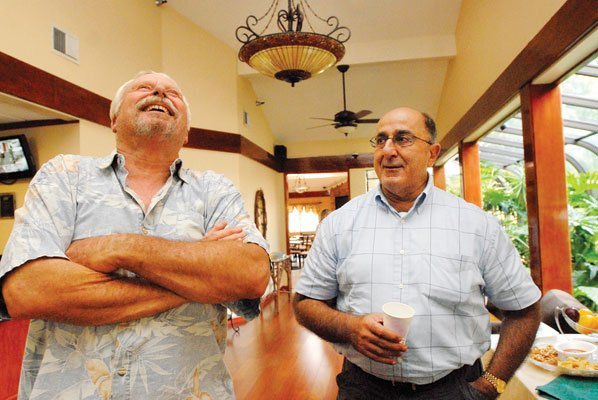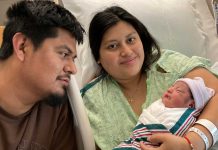When a generation of young Americans returned from war-torn
Vietnam, they quietly hung up their uniforms and vowed never to
look back.
Also with this story, a video of photo gallery.
When a generation of young Americans returned from war-torn Vietnam, they quietly hung up their uniforms and vowed never to look back.
Memories of dead bodies littering the beautiful jungle floor, sleeping in foxholes with one eye open and slogging through quagmire for weeks on end were locked away for decades while soldiers struggled to reclaim the lives they left behind. Soldiers in Company C of the 1st Battalion, 22nd Infantry Regiment, 4th Division U.S. Army didn’t bother to exchange phone numbers or addresses when they scattered across the U.S. after coming home from a battle that wiped out nearly 80 percent of their company.
Nearly 40 years later, a family crisis sparked a dying man’s need to reunite with old comrades. Jim Murray of Sulphur Springs, Ark., was fighting a losing battle with lung cancer caused by Agent Orange, said his wife, June Murray.
A medic with Company C, Murray was wounded in Vietnam but never awarded a Purple Heart – an award that would give the family greater medical security once the soldier died. The only way to verify retroactively that Murray was, in fact, wounded was to find three eyewitnesses who could corroborate his story.
The search was on for a group of men Murray hadn’t heard from in decades. A few online searches turned up names he recognized from his tour in Vietnam. The family took a shot in the dark and hit success when an e-mail turned up several old friends.
Jim Murray did receive his Purple Heart posthumously, a day after he died in 2003. He was buried with the award in his hand.
Tinged with bittersweet memories, the annual reunions that were sparked by Murray’s search for a helping hand resemble family gatherings. This year, Company C is gathering in Gilroy. Thirty-five years of suppressed memories flow, alleviating the bottled up tension that has broken many veterans of Vietnam.
“There is a constant lump in my chest,” said Jack Chavez, a native Gilroyan who was drafted at the age of 20. “These reunions help.”
Gruff hugs were exchanged as members of Company C filtered into the Forest Park Inn.
Today, Company C survivors are a jovial bunch, with a few more gray hairs than the grinning young men posing for photos taken by Chavez’s Kodak Instamatic in the Vietnamese jungle in 1968.
“Charlie’s gonna have a joke,” Chavez said of Charlie “Doc” Shyab, a school teacher from Maryland. “It’s gonna be dry and it’s gonna be corny.”
The men share an indescribable bond born of war. “More than brothers,” the men’s collective memories of the year they spent in the central highlands of South Vietnam reveal terrifying battles they’d rather forget.
Led by Capt. Larry Konermann, Company C was a motley crew of men who hailed from across America. After completing his training in Louisiana, Chavez shipped out and was stationed at a base in Pleiku, not far from the Ho Chi Minh Trail. Grouped with men he had never met, Chavez remembered sheets of rain that fell for 90 days straight. The men were handed M-16s that looked like they had been through hell and back, remembered Sgt. Elmer Hale, a retired lab worker from Lawrenceville, Ill.
“These weapons looked like something that had come over on the Mayflower,” Hale said. “They were in bad shape.”
By day, the soldiers were on the move, scouring the hills for Vietcong. With 90 pounds of gear on their backs, they traipsed through the jungle, clearing land so they could set up mines. Nights were spent in foxholes, surrounded with sandbags.
As a radio operator, Chavez spent many a night keeping the watch and radioing back to the command post should enemy forces approach.
“There were a lot of false alarms,” he said. He remembered more than one time when a critter sent him shaking and reaching for the radio. “It’s black, you’re in the jungle. You become very aware of odors and your hearing becomes acute.” The odor of human stench and cigarette smoke was a telltale sign that the enemy was near, he said.
“We were living in the dirt and the mud,” Shyab said. “We figured we were going to die. We are all alive by inches.”
When the North Vietnamese Army and Company C clashed at the Battle of Chu Moor Mountain in April 1968, dozens of lives were lost. Up against mortars, B-40 rockets, snipers and flame throwers, the battalion fought a vicious, week-long battle that left the mountain in U.S. hands, but at a devastating price.
“Those guys that died on Chu Moor are heroes,” Chavez said.
The slaughter was too much for Lt. Bill Zimmerman, who was scheduled to leave Vietnam and meet his new wife in Hawaii when the battle broke. He went back to help his men and was killed in action April 28, 1968, along with dozens of his troops.
Medics like Murray, Shyab and Bud Roach – a school administrator from Whitewright, Texas – had a high turnover rate and Roach remembers hearing the “ping” of bullets whizzing by his helmet as he scrambled into the fray to treat a wounded warrior.
“You had to give up that instinct to forget others and protect yourself,” he said. “We had a job to do. By God’s grace I didn’t get shot.”
The naive, guileless men that geared up and shipped out to Vietnam returned home vastly different people from when they left.
“We left thinking nothing would happen,” Chavez said. “We thought we were going to kick some ass.”
“I was as naive as anyone about people killing and people dying,” Roach said. “I’d never seen a dead body out of a coffin. (In Vietnam), I was standing in a field with a thousand dead bodies. Do you know what that’s like?”
No parades or welcoming committees greeted the men when they set foot back on “friendly” soil. They were warned of the protests that divided the nation and dreaded the insults that flew. Unlike today, many of the demonstrations failed to differentiate between support for the troops and support, or lack thereof, for the war.
“I hung up my uniform in the closet and hung up Vietnam at the same time,” Roach said. “That was it.”
Thirty-five years of silence, 35 years of blocking out memories only to find them flashing back when they were least expected, 35 years of suffering alone were ended by a phone call and a familiar voice at the end of the line.
When Shyab walked up behind Chavez at the group’s first reunion in Plano, Texas, Chavez recognized his voice immediately, even after 35 years. Being together doesn’t make Vietnam go away, but it makes it easier to cope with.
“When we got home, we didn’t talk about the war,” Chavez said. “I guess it was a coping mechanism to shut down completely.”
Friends and family helped the soldiers through but nothing compares to the one weekend a year when the band of brothers reunites.
“That bond that we have,” Chavez said, shaking his head slowly with Shyab by his side, “it’s something else.”
Company C
Soldiers: 85-90
Killed: 30
Wounded: 40
Attend reunions: 20
Numbers are approximates provided by men of Company C














